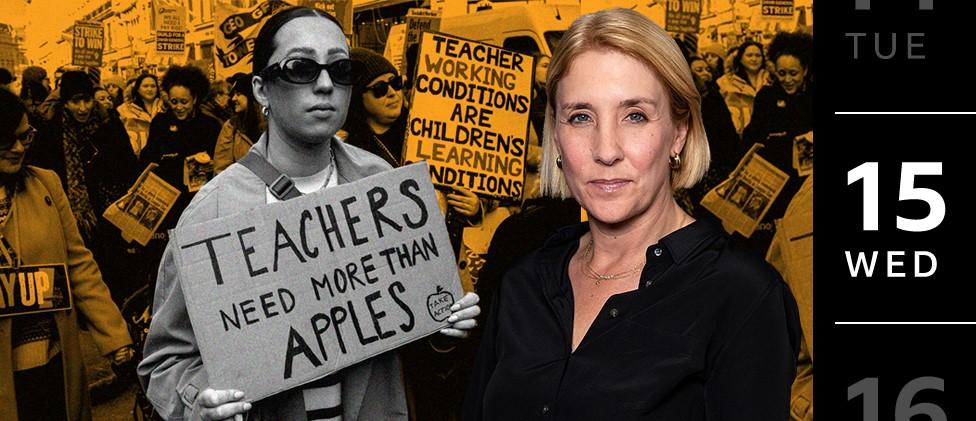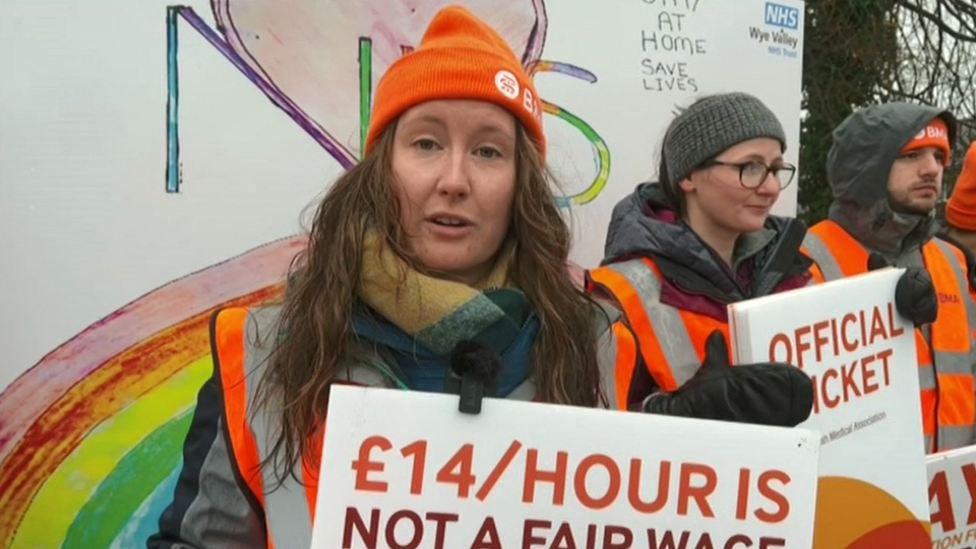Strikes Update: How Wednesday 15 March's strikes affect you
- Published

When Chancellor Jeremy Hunt stands up in parliament to deliver his Budget at lunchtime on Wednesday, he might well hear a crowd of protesters heading in his direction.
Making their way down Whitehall are likely to be thousands of teachers and other public sector workers all calling for pay rises.
Just over the river from the House of Commons, junior doctors will be standing on picket lines.
Teachers are striking on Wednesday and Thursday in England - their action in Wales was called off following a revised offer from the Welsh government. University staff are walking out on those days too.
Wednesday also sees industrial action by London Underground drivers and the biggest strike by civil servants so far with as many as 150,000 taking part.
It is not likely to affect the delivery of the Budget though as it doesn't involve some of the higher paid mandarins at the Treasury.
But pick up the phone to an HMRC call centre and it might take them a while to answer. In all, over 400,000 public sector employees are taking action.
Quite the backdrop for the chancellor's big day.
Teachers
Wednesday sees the beginning of a two-day strike by teachers in England who are members of the National Education Union (NEU). Teachers have been on strike several times since February, in an ongoing dispute over pay and funding.
It is expected to affect all schools in England and includes NEU teachers in sixth-form colleges.
No disruption is expected in Wales, where industrial action has been called off following government talks.
During previous strikes on 28 February and 2 March, more than half of schools closed or restricted attendance.
The Department for Education advises, external parents to send their children to school unless school leaders have informed you otherwise.
You can read more here about why teachers are striking.
Junior doctors
Wednesday will be the final full day of strike action this week by junior doctors in England, who are walking out over pay and and conditions.
During Monday and Tuesday, NHS managers reported that A&E units were busy as senior staff covered for striking doctors.
Junior doctors make up about 45% of the medical workforce, and two-thirds of them are members of the British Medical Association and Hospital Consultants and Specialists Association unions which are organising the strike.
They are planning on continuing walking out of emergency as well as planned care.
Consultants and other senior doctors are being drafted in to provide cover.
Planned appointments have been postponed, although how many is as yet unclear.
Industrial action by nurses over the winter caused some trusts to cancel 20% of routine treatments. It is likely the impact of the junior doctor strike will be greater, according to the BBC's health correspondent, Nick Triggle.
You can read more here about why junior doctors are taking strike action.
Civil servants
Up to 150,000 civil servants, working across more than 100 government departments and agencies, will be on strike.
Members of the Public and Commercial Services and Prospect unions are taking action in a dispute with the government over pay, pensions, job security and redundancy terms.
The union said its members from 123 government departments would take part in the industrial action, which includes staff at the Department for Transport, the Department for Health and Social Care and the Home Office.
The PCS union represents thousands of people who work in government departments as well as those at organisations such as Ofsted, the Maritime and Coastguard Agency and Border Force.
You can read more here about why civil servants are striking.
London Tube Strikes
Transport for London (TfL) is warning Tube passengers there will be "little or no service" during Wednesday's strike action by RMT and Aslef members.
Members of both unions are due to walk out in a dispute over job cuts, pensions and conditions.
TfL said the Elizabeth Line, Overground, DLR, trams and buses would be "busier than normal".
It has advised passengers travelling on Wednesday to allow more time for their journeys and to check the latest information before they travel.
TfL also warned that the closure of Tube stations might mean some services would be unable to stop at all stations or run to their normal destinations.
Tube services on Thursday 16 March are expected to start later than normal.
You can read more here about why some TfL staff are striking.
BBC
BBC local radio, regional television and digital services in England are being disrupted today because of strike action.
The 24-hour action from 11:00 this morning by members of the National Union of Journalists is over plans to merge some local radio programmes.
The 13.30, 18.30 and late regional programmes across England are not expected to be broadcast.

Follow Zoe Conway on Twitter, external
Additional reporting by Faarea Masud


How are you affected by the strikes? Are you taking part in strike action? You can email: haveyoursay@bbc.co.uk, external.
Please include a contact number if you are willing to speak to a BBC journalist. You can also get in touch in the following ways:
WhatsApp: +44 7756 165803, external
Tweet: @BBC_HaveYourSay, external
Or fill out the form below
Please read our terms & conditions and privacy policy
If you are reading this page and can't see the form you will need to visit the mobile version of the BBC website to submit your question or comment or you can email us at HaveYourSay@bbc.co.uk, external. Please include your name, age and location with any submission.
Related topics
- Published15 April

- Published13 March 2023
